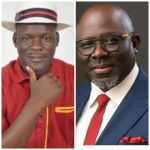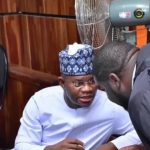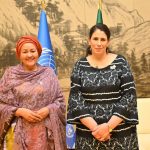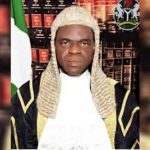4th Article Title:
The Silence Must End: Nigerians Deserve Clarity on Vice President Kashim Shettima’s Future.
By Bala Salihu Dawakin Kudu of Democracy Newsline Newspaper
26th June 2025
As Nigeria prepares for the long political road to the 2027 general elections, a cloud of growing uncertainty hangs over Vice President Kashim Shettima’s political future. At the heart of this tension is the persistent silence of President Bola Ahmed Tinubu on a fundamental issue: will Shettima remain his running mate in 2027?
The stakes are high, and speculation is rife. Despite President Tinubu’s public embrace of a second-term ambition—an aspiration that has attracted strong support across political quarters—the issue of who will accompany him on the ticket remains unresolved. This ambiguity has fueled widespread concerns, political maneuvering, and a resurgence of the sensitive debate around the Muslim-Muslim ticket, which drew sharp criticism during the 2023 election campaign.
The silence from President Tinubu is more than a political tactic—it is a void that breeds speculation. In a country as complex and diverse as Nigeria, every unspoken word at the top levels of leadership can echo across political landscapes and ethnic divides. Nigerians, particularly from the North-East region and beyond, deserve a clear statement on whether the Vice President remains a part of the vision for 2027.
The recent North-East APC stakeholders meeting in Gombe, which was supposed to consolidate support for Tinubu’s re-election, instead exposed fractures within the party. The glaring omission of Vice President Shettima in the endorsement speech by Mustapha Salihu, the APC National Vice Chairman (North-East), sparked unrest. Party members loyal to Shettima erupted in chants of protest, underscoring the importance of symbolic recognition and political inclusion.
Political analysts argue that the omission may not have been accidental. Some view it as a calculated move—possibly a test balloon—to assess public reaction to a potential sidelining of Shettima. Whispers have emerged that certain political factions, including some governors and Villa insiders, are pushing for a Northern Christian replacement, potentially from Bauchi State.
Observers have noted parallels between this unfolding situation and President Tinubu’s time as governor of Lagos State, where he frequently reshuffled his deputies. This historical pattern lends credibility to fears that Vice President Shettima may be replaced before the next election.
Such uncertainty not only affects the Vice President’s standing but also has broader implications for political stability and party unity. While internal party strategy is valid, transparency is essential in a democratic system where the electorate must be carried along.
Despite the storm surrounding him, Vice President Kashim Shettima has remained composed. According to APC insiders, Shettima continues to express confidence in the President’s goodwill, often saying: “Wallahi, the president is a good man and holds me in the highest esteem.”
This calm faith may be admirable, but it also raises concerns. Political loyalty should not be mistaken for passivity, especially when calculated efforts appear underway to erode one’s influence and legacy. If there are grievances among Shettima’s allies or gaps in his political outreach, those need urgent redress. Politics is about perception as much as performance.
The time has come for President Tinubu to address this matter directly. His silence is being interpreted as strategic ambiguity, but in a country as polarized and politically sensitive as Nigeria, silence can also be dangerously divisive.
By clarifying Shettima’s status, President Tinubu would not only quell damaging speculation but also demonstrate leadership that values transparency and unity. His voice can restore confidence and close the rift that is threatening to deepen within the APC.
If the intention is to retain Shettima, the President must make that clear and empower his running mate. If not, honesty and political courtesy demand that such intentions be communicated early, respectfully, and through appropriate channels—rather than allowing silent maneuvers or indirect signals to dominate the narrative.
Nigerians must remain vigilant. The democratic process demands accountability from its leaders. The Vice President’s political future should not be determined through shadowy plots or factional whispers. Any change in ticket composition should come through open dialogue and respect for internal party democracy.
It’s essential that stakeholders—particularly from Northern Nigeria—recognize the significance of this moment. The region’s votes were instrumental in Tinubu’s 2023 victory, and any perceived marginalization could trigger political backlash. If Tinubu seeks another four years with Northern support, he must demonstrate unity with Shettima or clearly explain any divergence.
As some party chieftains have observed, attempts were made to block Shettima’s rise in 2023, yet he prevailed. His supporters believe his position is not only politically earned but divinely ordained. Whether or not that remains the case in 2027 is ultimately a decision that lies with both God and President Tinubu.
But while faith plays a role in politics, action remains critical. If Shettima believes he is being sidelined, he must also reflect, reconnect with his political base, and address the concerns of those who feel alienated under his tenure.
Likewise, if the goal is to avoid embarrassment at the convention or further unrest within the APC, it may be in the party’s interest to resolve this issue long before campaign season begins in earnest.
President Bola Tinubu has proven himself a shrewd and experienced politician. But with experience comes responsibility. The nation is watching. The APC is watching. And Vice President Kashim Shettima deserves clarity.
The silence must end. For the sake of unity, transparency, and political integrity, Nigerians must hear the truth.
“Let Mr. President speak”.
Bala Salihu Dawakin Kudu can be reach out 08060017934.












